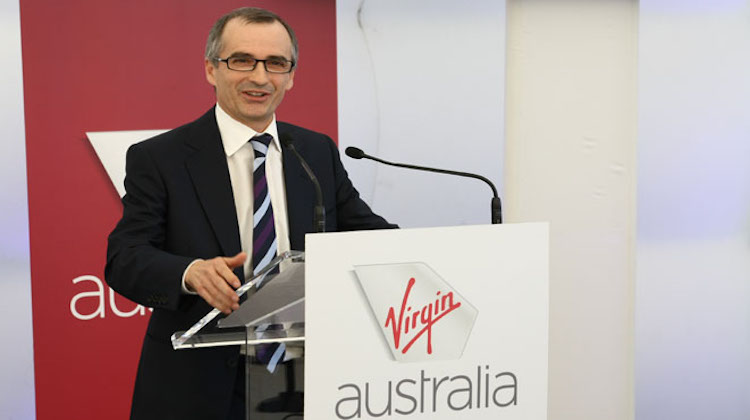
Virgin Australia has appointed experienced transport and logistics executive Paul Scurrah as its new chief executive.
The company said in a statement to the Australian Securities Exchange (ASX) on Wednesday Scurrah would replace current chief executive John Borghetti on March 25 2019.
Scurrah, an Australian, will be Virgin Australia’s third chief executive since the airline began flying in 2000, following Brett Godfrey (2000-2010) and Borghetti (2010-2019).
Most recently, Scurrah was chief executive at ports operator DP World Australia before leaving at the end of 2018 at the end of a five-year contract. He was also previously chief executive at Queensland Rail.
In addition to executive general manager roles at Aurizon, Flight Centre and Tourism Queensland, Scurrah also has aviation experience, having previously worked at Australian Airlines, Ansett and Qantas. He was also one of the founding directors of Regional Express (Rex).
Currently, Scurrah is a non-executive director of the Australian Football League club Gold Coast Suns. He will also join the Virgin Australia board when he begins as chief executive.
Virgin Australia chairman Elizabeth Bryan described Scurrah as a highly regarded business leader in Australia.
“His appointment is testament to his strong leadership credentials which include more than 20 years’ experience in transport, logistics, travel and aviation,” Bryan said in a statement.
“The board received enormous interest in the role both locally and internationally and Paul’s highly relevant transport and logistics expertise, and strong commercial background make him the ideal candidate to consolidate the Group’s achievements and continue to build momentum into the future.”
Scurrah, who lives in Brisbane, will join Virgin Australia with the company in the midst of a three-year transformation program that has involved the disposal of Embraer E190 regional jets and some ATR turboprops, the transition of Tigerair Australia from an Airbus A320 to Boeing 737-800 operator and capital raising efforts to boost the balance sheet.
And the airline is battling a Qantas that is making healthy profits across the different market segment.
Finally, there is ongoing speculation about the company’s share register, which features five major shareholders in Etihad Airways, HNA Group, Nanshan, Singapore Airlines and Sir Richard Branson’s United Kingdom-based Virgin Group, and whether the company would eventually be delisted from the ASX and taken private.
In February 2018, the board decided not to privatise the company. Instead, it offered small shareholders with less than $500 in shares the option to sell their shares back to the company for 30 cents per share.
Its most recent financial guidance was for underlying profit before tax to be up in excess of 20 per cent in the half compared with the prior corresponding period.
“The group expects that the underlying profit before tax result for the first half of the 2019 financial year will be at least $100 million,” Virgin Australia said in a trading update issued in October 2018.
This represented “at least a 22 per cent increase on the prior corresponding period result of $81.9 million”, Virgin said.
The $81.9 million result differs from the reported $102.5 million underlying profit before tax for the first half of 2017/18 due to some changes in the way the company has decided to recognise cash flow hedges.
Virgin Australia reported a statutory net loss of $681 million for the 12 months to June 30 2018, compared with a loss of $220.3 million in the 2016/17 financial year, as restructuring charges, writedowns and accounting adjustments weighed on the bottom line.
However, there was a significant improvement in underlying profit before tax, which removes one-off items and was regarded as the best indication of financial performance.
Bryan said Scurrah would inherit a strong business.
Virgin Australia was due to deliver its 2018/19 first half results on Wednesday, February 13.
Scurrah appointment follows Borghetti’s announcement to step down in August 2018
In August 2018, Borghetti announced that he planned to step down by the time his contract ended on January 1 2020.
Under his leadership, the airline has been transformed from a low-cost carrier into an airline group with a full service (Virgin Australia) and low-cost carrier (Tigerair Australia) arm, as well as regional and cargo operations and a frequent flyer program with about nine million members.

However, what has eluded Virgin Australia under Borghetti has been consistent profitability, with the airline group racking up losses in excess of $1 billion over the past six financial years. The expansion into new markets, investment in upgraded products both on the ground and in the air also took its toll on the company’s balance sheet.
Nonetheless, Borghetti is credited with the transformation of Virgin Blue to a full-service and diversified airline group and adding competition to the Australian aviation sector.
“John has made a significant mark on the aviation industry as a whole and Australian travellers have benefited because of his commitment and dedication to improving airline travel,” Bryan said.
“The board and I are grateful for his leadership and transformation of the airline into the diversified group that it is today.”
Borghetti has spent more than four decades in aviation, having worked at Qantas for 37 years where he rose to executive general manager. The veteran aviation executive left the Flying Kangaroo in 2009, after Alan Joyce was named chief executive.
While it was unclear what Borghetti’s next step will be, he currently sits on the board of drinks company Coca-Cola Amatil. And his previous director positions included being on the board of CARE Australia, The Australian Ballet, Piper Aircraft USA and Energy Australia.





